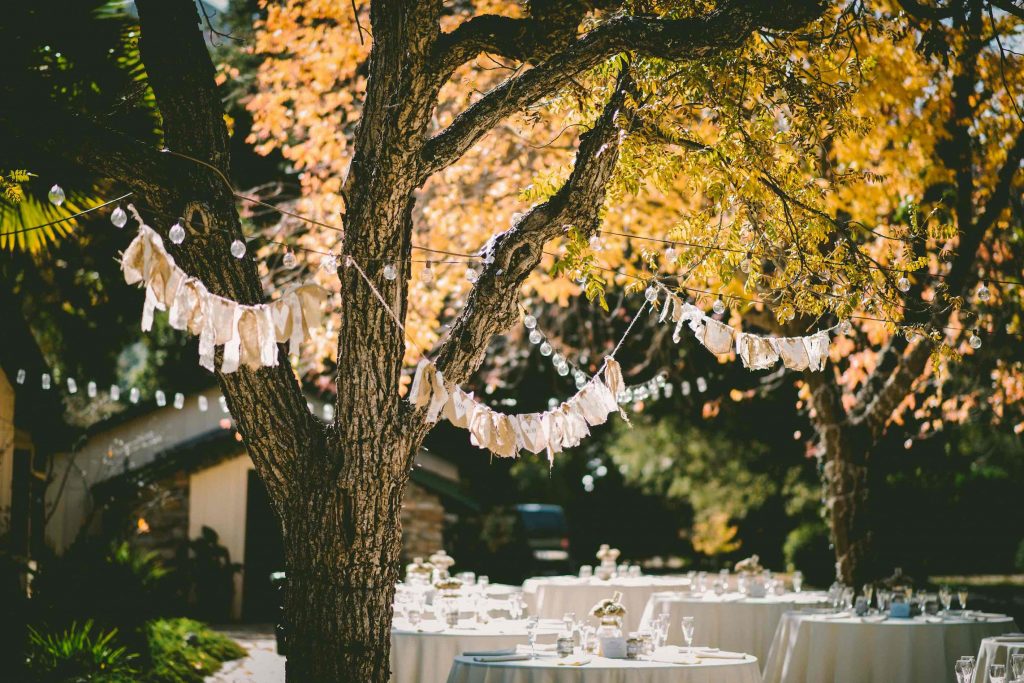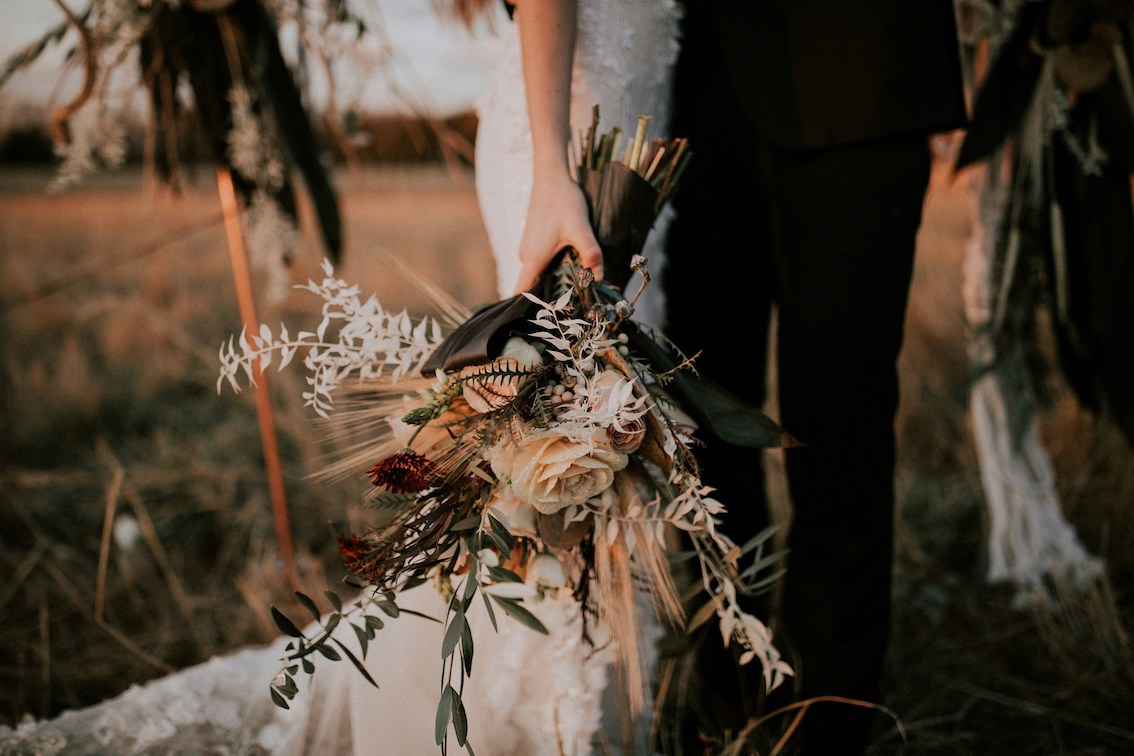Organizing a wedding is an exciting and complex adventure that raises many questions. One of the first considerations is the choice of date. The timing of the wedding can have a significant impact on everything from the general atmosphere on the big day to logistical costs. The temptation is great to get married in the high season, during the summer months, while others couples opt for a less traditional period, in October, when the days are still beautiful, or even later.

What are the advantages of a summer wedding?
Summer weddings are more popular for several reasons.
- The weather is generally milder, so everything can be organised outside: the secular ceremony, if applicable, the meal, the dance, the photos…
- The longer days also mean greater flexibility.
- Nature is very pleasant: plants and flowers are at their most colourful and fragrant, like the lavender fields in the south of France in June-July. Flowers from your florist will also be cheaper.
- A pretty reception venue by the sea or in the countryside can also stand on its own in this heightened natural climate, when you’ll need to decorate a room indoors.
- The entertainment will be easier to organise: pétanque, molky or something else.
- A summer wedding also offers the advantage of several outdoor areas: one for the ceremony, another for the cocktail reception / meal and perhaps a 3rd for brunch the following day. This will not necessarily be the case indoors.
Disadvantages
However, the decision to get married in the summer is not without its advantages:
- Reception venues are booked months or even years in advance. The most popular venues are booked at N+1. The 2024 season is long gone, and there are only a few Monday-Wednesday or Tuesday-Thursday mid-weeks left, if you don’t mind getting married on a weekday.
- If you choose the June-September period, the price of venues is much higher due to the high demand and is non-negotiable. On the other hand, you can always talk about an off-season wedding. The same applies to caterers and other service providers, photographers, make-up artists, DJs, etc.
- Your guests’ diaries may be full with other weddings, annual holidays or simply work, and there’s always someone missing from the service during the summer. In these cases, it’s difficult to take extended weekends…
- Paradoxically, the weather can also be a disadvantage for summer weddings. Personally, I avoid weddings in August, firstly to enjoy my family and secondly for the convenience of the bride and groom and their guests. There’s nothing worse than a secular ceremony in direct sunlight, or a photo session that goes on forever. You need to think about parasols, hats, fans and bottles of water, and adapt your schedule: it’s hard to plan for the town hall at 2pm when you know that the outdoor ceremony will be bearable from 5pm. What can you do with this time?
- The heat also has an impact on the bride’s make-up (it’s essential to try it on a few days beforehand, preferably at the start of the day, to check that it will hold!) It also has an impact on the flowers, which won’t last as long in the sun. The decorator will need to adapt the choice of flowers, the venue (in the sun or in the shade) and her timing. Everything will have to be done more or less at the last minute to ensure that the flowers stay as fresh as possible. It’s better for the photos!

The advantages of off-season weddings
In recent years, out-of-season weddings have become increasingly popular. The autumn months, from September to November, and the winter months, from December to February, offer distinct charms. Autumn weddings are often associated with warm colours, rustic decorations and pleasant temperatures. Winter weddings, on the other hand, can benefit from a fairytale atmosphere with festive decorations, open fires and even snowflakes for a romantic touch.
Off-season weddings have also their advantages.
- Venues are often more available, offering greater flexibility in the choice of date and options.
- Photographers, DJs and caterers are also less in demand in autumn, and are more available and willing to listen.
- As a result, an out-of-season wedding has the not inconsiderable advantage of allowing you to plan later in the year. What could be more difficult than planning 15 or 18 months in advance? And to stick with it! Darling, we’re getting married in 18 months! … Oh great … when you don’t even know where you’re going to spend your next holiday.
- The temperatures are more pleasant and make everyone’s job easier: the caterer, who doesn’t have to hide his preparations under a tent for fear they’ll go haywire. The photographer, with his 2 cameras slung over his shoulder, will be eternally grateful to you for not ending up with his shirt soaked from chasing after his shots! The decorator will be able to set up her flowers calmly and in advance. And your make-up will hold up better, unless of course you’re feeling really emotional…
- If you’re into decorating, an autumn or winter wedding can clearly help you stand out from your girlfriends. Warm materials and colours – red, orange and brown – will give your décor a completely different glow and enhance your photos in true “moody” style. It’s up to your imagination!
- And finally, the availability of yours truly! What wedding planner doesn’t ‘brag’ about booking dates out of season? It’s clearly more pleasant for us organisers to work in the autumn or even as early as March-April. We avoid the summer rush, we’re cooler in April than at the end of August, and a wedding in October will have given us the whole of the off-season to put the finishing touches to it. What happiness!
The disadvantages of an autumn wedding
However, off-season weddings are not without their drawbacks, as you may have guessed, otherwise everyone would be getting married in October!
- First of all, we all agree that the weather is a bit of a lottery. Depending on where your wedding takes place, in the north or south of France, not everyone is in the same boat. The risks are lower on the Mediterranean coast, but they do exist. So take your chosen region into consideration.
- The shorter days in winter can also limit the time available for outdoor ceremonies and daylight photo shoots. It’s hard to plan a town hall, church and cocktail party outside when the sun goes down at 6pm!
- Cooler temperatures may require you to plan appropriate heating solutions to ensure the comfort of your guests.
- And don’t forget winter weddings! The December-February period is clearly the time when service providers take to the sea, most often in the literal sense of the word. After an often intense season, it’s the holiday period when posts on Instagram of our favorite photographer sipping a cocktail on a heavenly island are in full bloom… Reception venues also take advantage of this time to get a makeover, or are simply closed.
To sum up, there’s no such thing as a good or bad season for planning your wedding. Everything will depend on the region and venue you have chosen, the availability of your guests – and yours – your budget and many other parameters that are up to you alone. Because every wedding is unique, don’t we agree?






